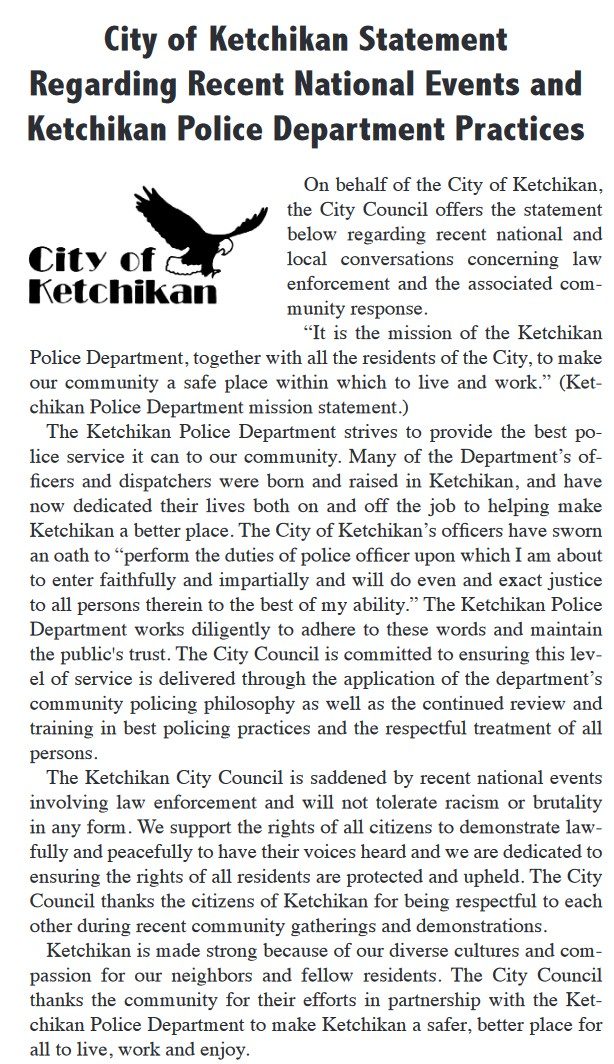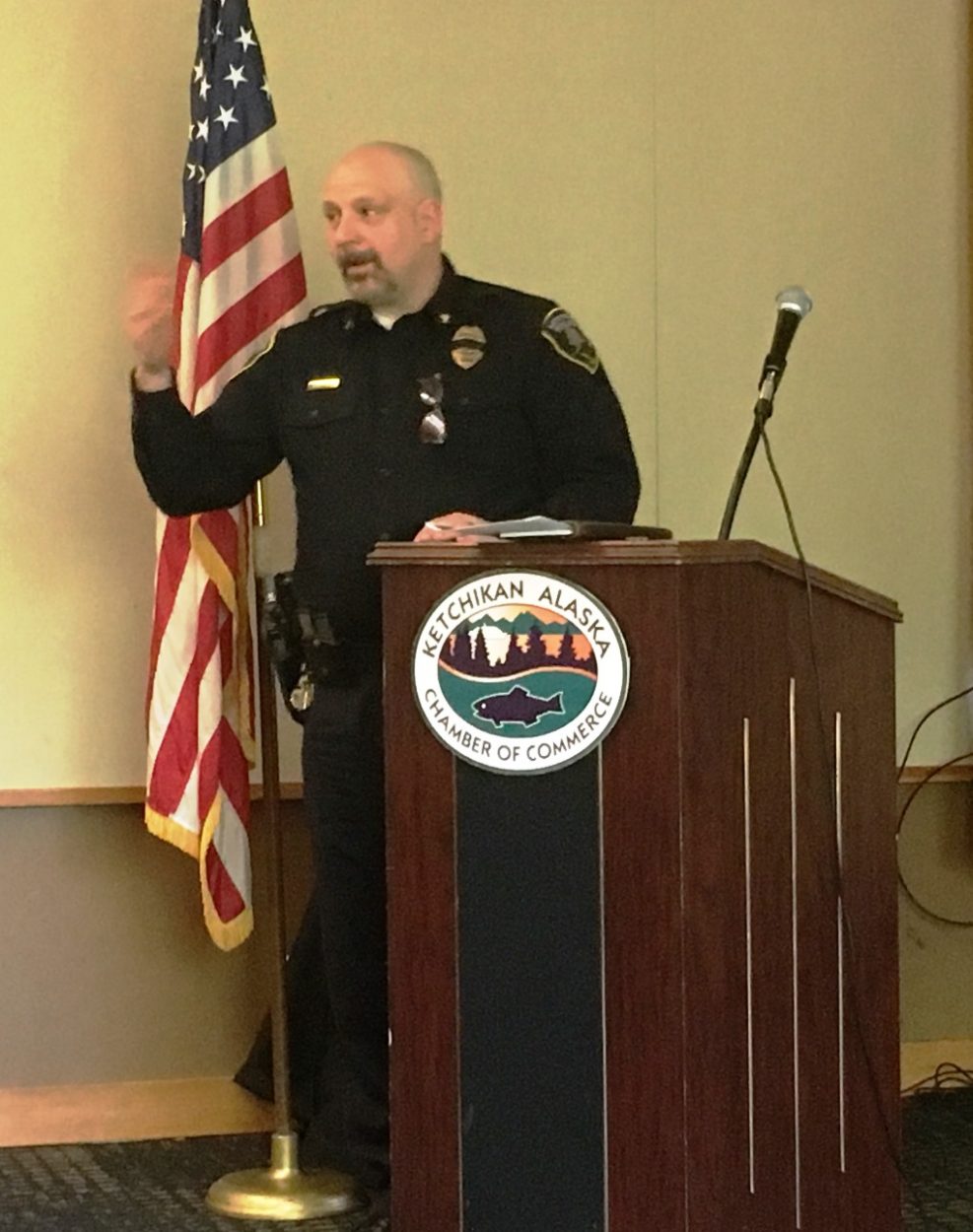In the wake of George Floyd’s killing by Minneapolis police, the City of Ketchikan released a statement condemning racism and police brutality. But some members of Ketchikan’s City Council wanted to go further, leading to pushback from members of the police department and members of the public.
It all started in the days shortly after the police killing of George Floyd. Two residents asked the Ketchikan City Council to tell the police department to draft a statement condemning racism and police brutality. One of them was Jason Baldwin.
“I, too, would like to ask for the city to loudly condemn the murder of George Floyd and to work with the police department to provide some clear guidelines as to how the department would handle a potential abuse of power case,” he said at the council’s June 4 meeting.
The council agreed.
Ketchikan City Manager Karl Amylon presented the results: a one-page letter reprising the police department’s mission statement — “to make our community a safe place” to live and work in partnership with the city’s residents. It emphasized that many of KPD’s officers grew up here in Ketchikan, and that the City Council is committed to continually reviewing and improving police policies. It condemned racism and acts of police brutality.

The statement ultimately issued by the Ketchikan City Council earlier this month says the body “will not tolerate racism or brutality in any form.” Council member Emily Chapel said she wanted the statement to include “action items.” (Screenshot by Eric Stone/KRBD)
But some on the City Council felt that didn’t go far enough.
“I guess I was hoping for some more action items on this, of what they’re doing. It was a quote of their mission statement and this reassurance that they’re going to uphold their oath,” said City Council member Emily Chapel. “And that seems like the minimum, right? Yes, you should uphold your oath and your mission statement. So I would like this to be strengthened before we approve it.”
Amylon suggested that council members take a crack at it themselves. So Chapel teamed up with two other council members — Dave Kiffer and Janalee Gage. The trio’s July 2 statement laid out concrete action: it asked for clearer policies for body cameras worn by Ketchikan officers, more de-escalation and mental health training and a revision of the department’s use-of-force policy.
It also dug into the past.
“Ketchikan is not alone in how it treated minority residents during its history,” the statement read, recalling images of Ketchikan’s history of segregation prior to statehood. The statement pointed to the disproportionate number of people of color in Alaska’s prisons today as evidence of racism within the criminal justice system. It called racism a public health crisis.
That set off a firestorm of criticism.
“It reads more like indictment. It reads like an opinion piece framed as a conclusion,” said the Ketchikan police’s head of investigations, Andy Berntson, addressing the city council on July 2. “We’re left to assume that there’s been some kind of investigation that’s identified areas that need improvement that center on hot button national topics and talking points.”
Berntson said he was concerned about what he called “a deep-seated conflict of interest” among council members — an apparent reference to Chapel’s work with the Public Defender’s office.
Others showed up to share their own experiences, like Officer Kevin Manabat.
“It would be naive of me to tell you that racism does not exist in our small community — because it does. It is not abnormal for me to encounter racial slurs from citizens while on duty,” Manabat told the council.
“But I would like to inform you all here today that I have not seen anything that remotely resembles racism within our department,” he continued. “I’m very proud of my Filipino heritage, I’m very proud to be a part of the Ketchikan Police Department.”
Others pointed to community outreach efforts like Coffee with a Cop and the National Night Out, where residents can get to know their local officers. It’s part of an approach known as “community policing,” officers testified. And part of that approach is to build trust between police and residents.
Officer Darryl Nichols said he’d been a police officer for more than two decades. He said senior KPD officials were leading the transformation.
“When I came in, Chief White, Deputy Chief Mattson, Lieutenant Berntson were given a task: to change culture,” he said.
And he says that’s well underway.
“These things take time, changing culture takes time, progressive change takes time,” Nichols said.
Numerous community members also came forward in support of Ketchikan’s police department.
“I want to say tonight, I support the Ketchikan Police Department, and I want to say thank you to Chief White,” resident Jeremy Bynum said.
“They not only have been professional, they have been sympathetic and they have been empathetic,” said jewelry store owner Jai Mahtani.
“So please keep that in mind — we don’t have the same problems that everybody else has. They’re not a racist department, and I really would like to take that letter or that statement off the table and do the original statement,” said businesswoman Abby Bradberry.

Ketchikan Police Chief Joe White speaks to the Ketchikan Chamber of Commerce in 2017. White defended his officers and department at the Ketchikan City Council’s July 2 meeting. (Photo by Leila Kheiry/KRBD)
Police chief White thanked them for speaking up.
“I am very saddened that I have to come tonight and defend my officers and my department against something that happened down south that we all agree was a complete tragedy,” White told the council.
He said the actions of the Minneapolis Police officer later charged with Floyd’s murder don’t reflect his department’s ethos.
“I can tell you we do not stand for brutality or abuse of power. We do not condone racism or discrimination,” he said. “What we do is we stand for community and our residents. We want to provide the best service at all times for everybody in Ketchikan.”
Like his officers, he asked the council to stick with the original draft referencing the department’s oath and mission statement.
“I would urge you not to pass the second letter. It is not reflective of our department, of ourselves, or of me as chief,” he finished. The crowd of spectators at the Ted Ferry Civic Center applauded.
One private citizen spoke in favor of the stronger statement — though, notably, it was one of the two residents who initially asked the city to issue a statement: Jason Baldwin.
“Thank you for fully acknowledging the history of racism and Ketchikan. I believe a thorough, transparent, community-driven review and update of the training procedures and policies used by the police department will go a long way towards ensuring that the future of Ketchikan is an inclusive one,” Baldwin said.
Council Member Chapel said she was surprised at the response from the crowd — especially from the seven current and former police officers who spoke out.
“Not one of those officers reached out to me and asked me about the intention, and never once were we trying to insinuate that Ketchikan’s police officers were racist,” she said.
She said she’d asked to include a police officer on the committee revising the statement, but without formal direction from the City Council, city manager Amylon denied the request.
She said she’d personally had nothing but good experiences with the Ketchikan Police Department. But she called out what she termed the department’s “defensiveness” in the face of criticism.
“The chief said to the community, ‘Thanks for backing us.’ I want to ask you, Chief: Against what enemy? Who’s the enemy here?”
“You,” the crowd responded.
The council voted 6-1 to approve the original, shorter statement. Council Member Emily Chapel cast the lone vote in opposition.





